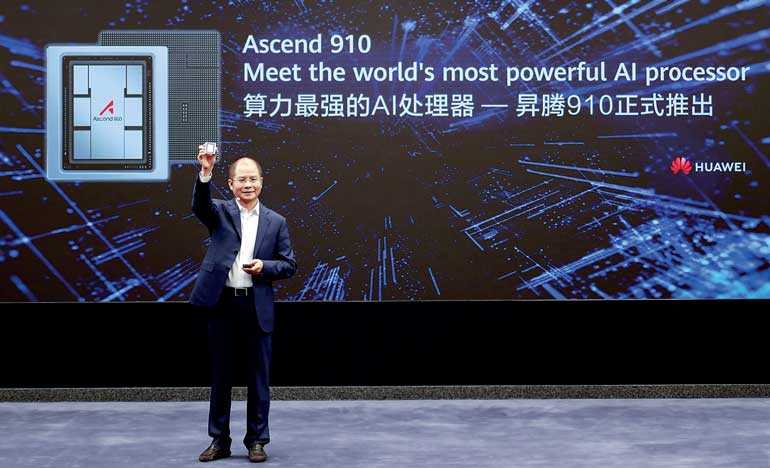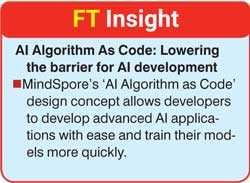Sunday Feb 22, 2026
Sunday Feb 22, 2026
Tuesday, 27 August 2019 00:25 - - {{hitsCtrl.values.hits}}

Huawei on Friday achieved new milestones in its quest to empower customers and communities with Artificial Intelligence by launching the world’s most powerful AI processor – the Ascend 910 – as well as an all-scenario AI computing framework, MindSpore.
“This launch is a new milestone in our AI roadmap; it’s also a new beginning,” Huawei’s Rotating Chairman Eric Xu told the international media including the Daily FT invited for the launch.
“We have been making steady progress since we announced our AI strategy in October last year,” said Xu. “Everything is moving forward according to plan, from R&D to product launch. We promised a full-stack, all-scenario AI portfolio. And today we delivered, with the release of Ascend 910 and MindSpore. This also marks a new stage in Huawei’s AI strategy,” he added.
Xu said Huawei’s AI portfolio covers all deployment scenarios, including public cloud, private cloud, edge computing, IoT industry devices, and consumer devices. The portfolio is also full-stack: It includes chips, chip enablement, training and inference framework, and application enablement. The Ascend 910 is a new AI processor that belongs to Huawei’s series of Ascend-Max chipsets. Huawei announced the processor’s planned specs at its 2018 flagship event, Huawei Connect. After a year of ongoing development, test results now show that the Ascend 910 processor delivers on its performance goals with much lower power consumption than originally planned.
For half-precision floating point (FP16) operations, Ascend 910 delivers 256 TeraFLOPS. For integer precision calculations (INT8), it delivers 512 TeraOPS. Despite its unrivalled performance, Ascend 910’s max power consumption is only 310W, much lower than its planned specs (350W).
“Ascend 910 performs much better than we expected,” said Xu. “Without a doubt, it has more computing power than any other AI processor in the world.”
Ascend 910 is used for AI model training. In a typical training session based on ResNet-50, the combination of Ascend 910 and MindSpore is about two times faster at training AI models than other mainstream training cards using TensorFlow. 
Xu said Huawei will continue investing in AI processors to deliver more abundant, affordable, and adaptable computing power that meets the needs of a broad range of scenarios (e.g., edge computing, on-vehicle computing for autonomous driving, and training).
Huawei also launched MindSpore, an AI computing framework that supports development for AI applications in all scenarios.
Huawei said AI computing frameworks are critical to making AI application development easier, making AI applications more pervasive and accessible, and ensuring privacy protection.
In 2018, Huawei announced the three development goals for its AI framework:
MindSpore, Huawei said, marks significant progress towards these goals. As privacy protection grows more important than ever, support for all scenarios is essential for enabling secure, pervasive AI. This is a key component in the MindSpore framework, which can readily adapt to different deployment needs. Resource budget environments can be big or simple as needed – MindSpore supports them all.
MindSpore helps ensure user privacy because it only deals with gradient and model information that has already been processed. It doesn’t process the data itself, so private user data can be effectively protected even in cross-scenario environments. In addition, MindSpore has built-in model protection technology to ensure that models are secure and trustworthy.
Adaptable to all scenarios – across all devices
The MindSpore AI framework is adaptable to all scenarios – across all devices, edge, and cloud environments – and provides on-demand cooperation between them. Its ‘AI Algorithm As Code’ design concept allows developers to develop advanced AI applications with ease and train their models more quickly.
In a typical neural network for natural language processing (NLP), MindSpore has 20% fewer lines of core code than leading frameworks on the market, and it helps developers raise their efficiency by at least 50%. Through framework innovation, as well as co-optimisation of MindSpore and Ascend processors, Huawei’s solution can help developers more effectively address complex AI computing challenges and the need for a diverse range of computing power for different applications. This results in stronger performance and more efficient execution. In addition to Ascend processors, MindSpore also supports GPUs, CPUs, and other types of processors.
When introducing MindSpore, Xu emphasised Huawei’s commitment to helping build a more robust and vibrant AI ecosystem. “MindSpore will go open source in the first quarter of 2020. We want to drive broader AI adoption and help developers do what they do best,” said Xu.
In October 2018, we promised a full-stack, all-scenario AI portfolio. And today we delivered – Huawei Rotating Chairman Eric Xu
The launch of Ascend 910 comes on the back of wide adoption of Ascend 310 AI processor and ModelArts that provides full-pipeline model production services.
Ascend 310 is Huawei’s first commercial AI System on a Chip (SoC) in the Ascend-Miniseries. With a maximum power consumption of 8W, Ascend 310 delivers 16 TeraOPS in integer precision (INT8) and 8 TeraFLOPS in half precision (FP16), making it the most powerful AI SoC for edge computing. It also comes with a 16-channel FHD video decoder.
Huawei said since its launch, Ascend 310 has already seen wide adoption in a broad range of products and cloud services. For example, Huawei’s Mobile Data Center (MDC), which employs Ascend 310, has been used by many leading automakers in shuttle buses, new-energy vehicles, and autonomous driving. The Ascend 310-powered Atlas series acceleration card and server are now part of dozens of industry solutions (e.g., smart transportation and smart grid) developed by dozens of partners.
Ascend 310 also enables Huawei Cloud services like image analysis, optical character recognition (OCR), and intelligent video analysis. There are more than 50 APIs for these services. At present, the number of API calls per day has exceeded 100 million, and this figure is estimated to hit 300 million by the end of 2019. More than 100 companies are using Ascend 310 to develop their own AI algorithms.
Huawei’s ModelArts provides model development services spanning the full pipeline, from data collection and model development to model training and deployment. At present, more than 30,000 developers are using ModelArts to handle 4,000+ training tasks per day (for a total of 32,000 training hours). Among these tasks, 85% are related to visual processing, 10% are for processing audio data, and 5% are related to machine learning.
